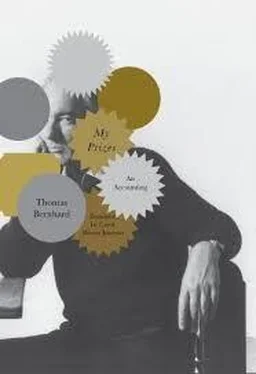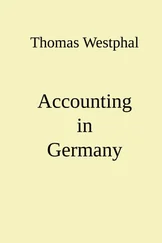The Franz Theodor Csokor Prize
Franz Theodor Csokor was a philosopher and dramatist and the author of a book titled As a Civilian in the War in the Balkans , which I had discovered in my grandfather’s library, and he was for many years the president of the P.E.N. club and a friend of my grandfather’s whom he deeply honored, and for many years he stayed in the tavern on the Wallersee that belonged to relatives of mine and in which I ran around when I was three and four and five and six and even when I was seven and eight, without having the faintest idea who the two gentlemen, Franz Theodor Csokor and Ödön von Horváth, were who were staying below me in the large rooms embellished with their Empire and Biedermeier furniture and a whole series of valuable late-eighteenth-century pieces and magnificent stucco work and their view onto the woods. Csokor and Horváth, the two friends who wrote the majority of their plays and novels in my relatives’ tavern, supposedly played with me on the wooden floors downstairs in the lower taproom and took me on walks to the lake, but I myself can no longer recall this. My grandfather often took walks with Csokor and Horváth, as I know. In my relatives’ tavern was a large room on the second floor where plays were put on all year round and perhaps this was the right atmosphere for the two playwriting friends, I still remember the mountains of brilliantly colored theatrical costumes under the roof and also a piece that was put on in the room in which a naked man tied to a post was whipped, for what reason I don’t know, but I can still see the scene quite clearly, it made a horrible impression on me, it was a political drama. Maybe Csokor and Horváth were inspired by this stage, it’s probable. I only met Csokor one time later on, in Salzburg, what the occasion was I no longer recall, but I do remember that he sat with the novelist George Saiko and me on the terrace of the restaurant in the fortress and talked uninterruptedly about my grandfather, all things that had gone on that were unknown to me. He loved my grandfather, for the way he talked about my grandfather is the way one only talks about someone one loves. Because I myself loved my grandfather like no one else on earth, I was happy to listen. For Saiko, a thoroughly self-important and egocentric type, and then a famous man, these descriptions of Csokor’s were almost unendurable, sometimes he tried to interrupt Csokor, but Csokor wouldn’t allow himself to be interrupted. This man , said Csokor, was once the Director of the Albertina in Vienna , and this information impressed me enormously. After the end of the meal Csokor, who was already an old gentleman at that time was tired but Saiko wasn’t tired and said goodbye to Csokor and said to me that as I was young and therefore naturally not yet tired, I should show the city of Salzburg to him, Herr Saiko, who wasn’t tired either. I had no idea at that moment what catastrophe was ahead of me. Csokor had barely taken his leave before Saiko, who had written the novel The Man in the Reeds , started to explain to me what a novel is. So we walked through the city in the burning heat and Herr Saiko told me nonstop what a novel is. I led him from one little street to the next, from one church to the next, but all he talked about was the novel, he stuffed me full of his theories about the novel, completely obliviously, he had absolutely no idea that his incessant articulation of his theories was already giving me a headache and I hated literary theories more than anything in my life, but most of all I hated so-called theories about the novel, particularly when promulgated by fanatical theorists like Saiko, who started by extinguishing all feeling for the material in the listener by talking at full volume. Herr Saiko talked and talked and talked for four hours about what a novel is and never stopped citing major or minor novelists and sometimes he said he’d misspoken, it wasn’t Joyce who’d said this or that, it was Thomas Mann, not Henry James but Kipling. My admiration that the man had once been the Director of the Albertina shriveled to the barest minimum over the course of this four-hour lecture, yes I suddenly despised this speechifier, I hated him and I kept thinking the whole time how I could get rid of him. But it was five hours, as I remember, before Saiko, having worn himself out, suddenly realized that he had more or less annihilated me with his lecture and said goodbye. I was too tired to catch my breath. I traveled to Venice overnight, as I recall, I woke up there to a beautiful morning and ran to St. Mark’s Square. But who suddenly spread his arms wide when he saw me coming, Herr Saiko! Naturally I wasn’t shocked by this absurdity, but willed myself to accompany Saiko to a restaurant near the Bridge of Sighs to eat cheese and olives and drink red wine. Herr Saiko had now stopped his perorations and was a pure pleasure-lover. He was going to Ancona that evening with his wife, he said, and pointed to a white ship in the background. But I didn’t want to talk about Herr Saiko but about Franz Theodor Csokor whom everyone who knew him had to love. After I returned from Venice I found a letter from Csokor in which he informed me that the P.E.N. club had just elected me a member! Unanimously! By ballot! Now I had a real mess. As with every other association in the world, I had no desire, naturally, to be a member of the P.E.N. club either. How to say this to the lovable old gentleman who wrote the Austrian national play 3 November 1918 without wounding him? I had nothing against the P.E.N. club fundamentally, even today I don’t really know what it is, but on no account did I wish to be a member, I had always hated associations and societies, and of course literary associations most of all. This is the reason I only recently resigned from the so-called Darmstadt Academy which I’d never signed up for and thirty years ago I also resigned from the Socialist Party, which I had actually signed up for not long before, I didn’t and don’t like parties and societies. So I sat down and wrote Csokor that I was conscious of the enormous honor of being elected to the P.E.N. club by ballot, as he’d told me, but that I couldn’t overturn my principle of never becoming a member of another association and it was because of this very principle that I couldn’t even be a member of an association of which he, Csokor, was president. I felt dreadful after mailing the letter. I did not receive an answer. Eventually Csokor died, and then so did Herr Saiko, after he’d received the Big Austrian Prize for Literature four or five weeks before his death and had explained to me (three days before his death) on a streetcar ride from Döbling to the First District that when buying shoes you should never buy them before four in the afternoon because it’s only around four in the afternoon that the foot takes on the correct and proper consistency for shoe-buying. Whenever I’m reminded of Saiko, who, as I mentioned, was the author of The Man in the Reeds , the first thing I think of is his lecture about never buying shoes before four in the afternoon and I have retained something of that lecture even today, and his four-hour lecture on what a novel is comes in second. But I have a real affection for both of these dead men today, whether they wrote the most incredible masterpieces of Austrian literature or not I come back to them, because my encounter with them is intimately connected with the awarding of the Franz Theodor Csokor Prize. When I won the prize which is dedicated to Csokor’s memory, the people who gave me the prize assumed that of course I was a member of the P.E.N. club. When I said no, of course I wasn’t a member of the P.E.N. club and told them my P.E.N. club story, they were very disappointed, for maybe they would never have given it to me as a nonmember. When I received the prize, in the P.E.N. club palace in the First District near the Minoritenkirche, presented by Piero Rismondo, the only one of the critics in Vienna who had time for my plays, I was in the process of being exposed to a particularly savage wave of personal attacks in the Austrian newspapers. Why, I don’t know. At any rate, it was definitely thumbs down. So the award gave me a real boost. Herr Rismondo, that subtle, cultivated man from Trieste, could not know that his words of approval lifted up a man who had been laid flat, that his prize speech was received greatly like music to the ears of someone who’d almost been broken. It was at this time that my Shooting Party and The President and Peter Handke’s A Leap in the Dark were being produced and this, it is thought, caused a deputation of the so-called Cultural Senate of the state, led by their president, the writer Rudolf Henz, to the Minister of Culture in his Ministry, in the form of a resolution demanding that the Minister should kindly intervene with the directors of the Burgtheater to ensure that Bernhard and Handke would no longer be produced, Bernhard and Handke being, as one could read daily in the Vienna papers, bad writers whereas he, Henz, and his fellows in the Cultural Senate were good writers. The scribblers who were all suckling on the bosom of the state were full of themselves! Every newspaper reported this hair-raising event without a single critical comment. This is only one example of the literary mood that prevailed in the country back then against me and Handke. Not for the first time, I wondered around then whether prizes should be accepted or not. After the Julius Campe Prize, the only one I accepted with a sort of leap of joy, I had a constant empty feeling in my stomach whenever there was a question of accepting a prize, and my mind balked every time. But I remained too weak in all the years that prizes came my way to say no. There, I always thought, is a major hole in my character. I despised the people who were giving the prizes but I didn’t strictly refuse the prizes themselves. It was all offensive, but I found myself the most offensive of all. I hated ceremonies but I took part in them, I hated the prize-givers but I took their money. Today I can no longer do it. Until you’re forty, I think, but after that? That I didn’t accept the prize money of eighteen thousand schillings attached to the Franz Theodor Csokor Prize, but had it donated to the care of prisoners in Stein, [2] Famous Austrian prison.
was also no way out. Even actions like this, that have a so-called social aspect, are not free of vanity, self-prettying, and hypocrisy. The question simply no longer presents itself, the only answer is to decline all further honors.
Читать дальше












